Dolly de Leon on the success of 'Triangle of Sadness' at Cannes: 'I am so proud and happy'
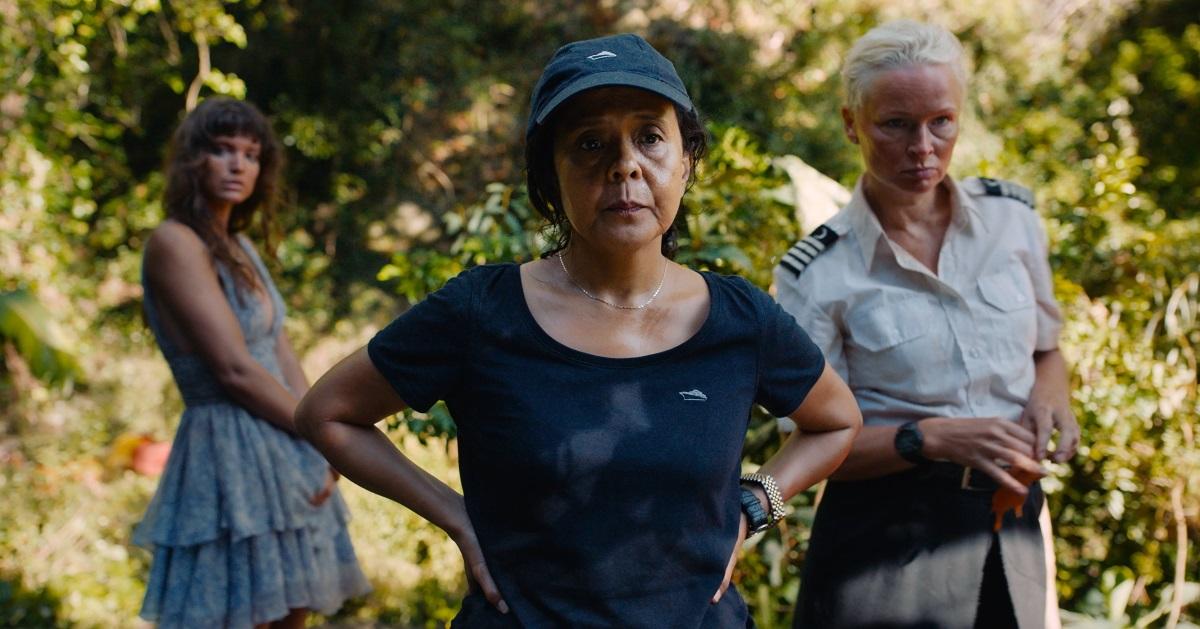
LOS ANGELES — It was definitely a day of joy and happiness when Ruben Ostlund's feature film, "Triangle of Sadness," which featured Filipina actress Dolly de Leon, won the Palme d'Or Award at the 75th Cannes Film Festival.
De Leon, who portrayed the feisty cleaning lady-manager Abigail in the film, enjoys a delicious twist in the story when the model-social influencers and uber-rich get stranded with her on an island.
Director Ruben Ostlund bagged his second Palme d'Or with the wild satire after winning the same award for "The Square" at the 70th Cannes Film Festival.
Also featuring Woody Harrelson (Captain Thomas Smith), Harris Dickinson (Carl), and Charlbi Dean (Yaya) among others, "Triangle of Sadness" also shows a group of Filipino workers on the cruise ship.
Filmed in Sweden, Greece and the Mediterranean Sea on the Christina O yacht, the film's shoot took 70 days with production forced to pause due to the COVID-19 pandemic.
Below are our interviews with Dolly de Leon and excerpts from the Cannes press conference with director Ruben Ostlund, actors Woody Harrelson, Harris Dickinson and Charlbi Dean.
Dolly de Leon
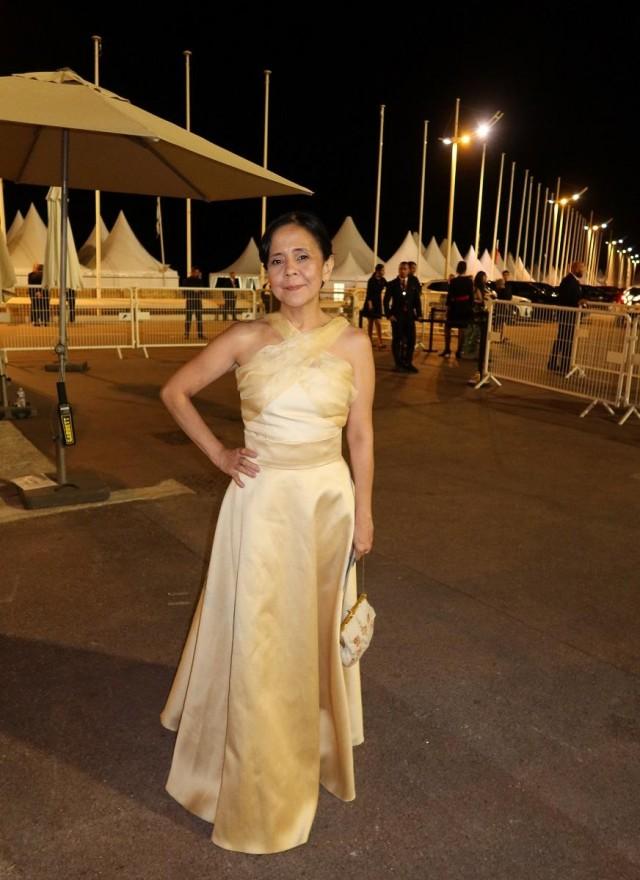
Dolly congratulations! You are part of the winning team! Ruben Ostlund's second Palme d'Or this time for "Triangle of Sadness." Talk about your experience here in Cannes – the win, the red carpet, the interviews, etc.
I am so high. So happy. This is really Ruben's medium, and I was really praying that we would get it because we all worked so hard to get it. This is my first time in Cannes and so I am so happy that we got the Palme d'Or award. I am so proud and happy for all of us.
How did you feel when Ruben Ostlund thanked you onstage and mentioned your name?
Siyempre kinilig ako. (I was so thrilled and delighted.) Ruben is always looking out for all of us. He was so sweet when he invited me to this event since everybody had left already. So, when he called me and invited me to this event (the closing ceremony), I was really so happy.
Who was the first person you called when you found out the movie won?
My daughter. She actually texted me first when she found out that we won. Then my sister, my brother, my family and then my friends.
Who are you wearing tonight (at the closing ceremony)?
I am wearing Ann Cuatico. She is the same designer who dressed me up for the premiere.
And you are celebrating and going to an after-party right now?
Yes, the after-party is actually over there (points). I am excited to meet a lot of great actors, filmmakers. I feel so privileged to be meeting great minds and talented people. I already met some of them inside the theater.
What do you think of this win – is this also a win for OFWs since they are also portrayed in the film?
It is a win for all of us. It is a win for Filipinos because we are represented in an international film that is well made and very beautiful. It is not only for Pinoys, but we also celebrate because it is a victory for OFWs as well because it shows the world that we are world class, we are great, we are brilliant and powerful.
What are you going to do after this?
Sleep for a long time, spend time with my kids and then go back to work.
How did you prepare for the red carpet?
I totally had fun and it is actually easier the second time around and I want to do it again and again.
What was that like that the (Palme d'Or) award was towards the end?
It was really nerve-wracking since the list was getting shorter and shorter and I was not sure if we were still a contender. Then I heard them mention Ruben's name and the title of our film and oh what a feeling!
Who are you excited to meet tonight?
I am really excited to meet Javier Bardem, but he is always surrounded by so many people. I actually also talked to "Close" director Lukas Dhont. He is only 31 years old, and he is wonderful and down-to-earth. I talked to him about his film and what inspired him to do it.
What were your thoughts when you finally knew what this movie was actually about?
From my perspective, because I'm Filipino, and there are a great majority of overseas Filipino workers who are domestic helpers in other countries. I felt like the piece was very important. That there is a person who has very little advantage, but one day takes over a society. She's the one in power. People look up to her and depend on her. I thought that was very important. It was really fun to play someone like that. That part alone, I was already sold in it. I thought it was a really fantastic idea to bring us up in a place where we normally don't feel like we're in because we come from underprivileged families and we're from a developing country.
Ruben Ostlund
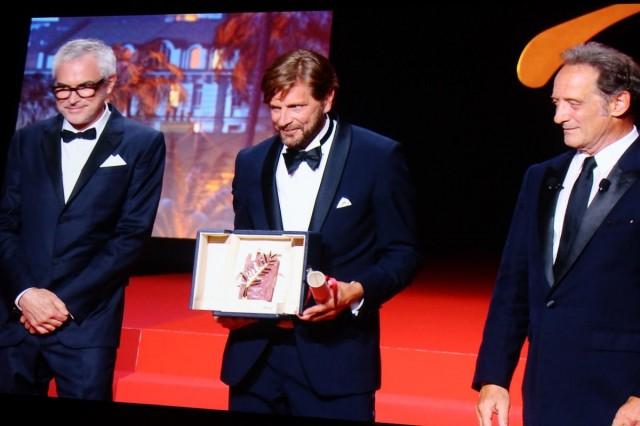
What attracts you to fashion and the world of fashion?
The thing is that eight years ago, I met my wife, Sina, and she is a fashion photographer. When we met, I just wanted to know everything about the fashion industry. We started to talk a lot about how the fashion industry is marketing their products and the condition of the models when they're working. Talking about beauty as a currency. I felt that at the same time, when we started to talk about this, that beauty is attractive, but it's also scary. Beauty is setting the hierarchy so much. That was really the starting point.
I can tell you one thing that I think is super interesting with how fashion is the strategy of the marketing. It comes from research about zebras in the savanna. It was a scientist that was looking at the zebras in the savanna and tried to spot one individual of the zebras in herd. It turns out it's really, hard because the zebras are just disappearing. Then they sprayed a red dot on the fur of one zebra and then it was possible to spot it, but immediately it got taken by lions.
So, this scientist was drawing parallel to the fashion industry, that the camouflage of the zebra is not to disappear in the savanna. It's actually to disappear in the herd. Fashion works in the same way. We are very aware of which social group we are connected to and how we dress in order to blend into that social group, so we are not popping out too much. It's great to have a new collection coming out in fall and a new collection coming out in spring because then we have to consume more clothes in order to not pop out in the herd. These things from a sociological behavioristic point of view were an approach I had when I started to look at the fashion industry.
People come to Cannes looking for films that are serious and not realizing that funny is smart. As a director, of bringing incredibly intensely philosophical ideas to a framework of entertainment, can you talk about finding that balance?
Thank you so much for asking that question, because I think that have been a goal for us with this film, that we wanted to create like a rollercoaster for adults. Something that is entertaining and challenging and funny. To really use the cinema for what it is used for. To have an experience together. When you leave the cinema afterwards, you should be like, "What has happened?" You have something to talk about.
We were doing test screenings and I wanted to get away from the audience that is sitting like this, "Hmm. Now I should react in a smart way because someone is watching me." Yeah. And then afterwards, like, "Yeah. The film has a problem." I wanted to bring in an audience, I was doing test screenings. We were doing in Berlin and in Stockholm and now, also on the countryside in Spain. It was so great to go to the countryside of Spain, where we had 30 people who has no experience of cinema and just bring them in. They were laughing and screaming straight out. I was like, "Finally an audience that is giving something back." We also have to remind ourselves that we Europeans are very often not a good audience. We sit with our arms crossed like this and like, "Okay, let's see what happens." And we forget that we are part of the show. We are part of the performance. When you go to US and have screenings there, the audience is like, "Wow." And okay, then you can talk about the content of the film, but we have a responsibility to create the great screening.
It was so beautiful yesterday (at the screening) because people were applauding like it was a football game someone told me. When Dolly's character was taking control, they're like, "Yeah." (laughter) And this is the goal with the movies that we're going to make in the future. Also, we are combining the best part of the European cinema that is intellectual, that is trying to say something about society, with the best part of American cinema that is like, "Okay, if we don't make this film successful, we don't have any job anymore. We can't support our children. They can't go to college." These two kinds of pressure and really create cinema are what makes it like, "I want to go to the cinema!"
According to the press kit, you did an average of 23 takes per shot.
What we do when we do a lot of takes is that first you try to find out exactly how to sculpt your decision. It often gets better up to take 20. Then somewhere, take 20, it's getting worse. Now it's not that good anymore. Then you fight and try to push up the level of the performance, and the intensity of the scene. And if you manage to do that, then you take a break.
Very often, it's the second last take or the last take that is used in the film. I actually brought a gong to the shooting.
After the gong, I go "action!" Then it can be such an intense feeling. That's the whole work as a director to try to capture that and bring that to the screen later on. That's why we're doing a lot of takes.
How did you pitch this script to producers and supporters? Because there's a lot happening in this movie. I was wondering what your line to them was.
One pitch was like, "The film starts in the fashion world. It goes to a luxury yacht, that it ends on a deserted island. We're going to follow a male and a female model that is a couple through this journey. We're going to see how they use their looks as a currency in these three different environments. We are going to have a Marxist captain on the yacht, played by Woody Harrelson. Then, everybody's like, "Yeah. I mean."
He is going to have the captain's dinner on the day when the weather gets rough. All the passengers will get super seasick, and he will get very drunk together with a Russian oligarch. They will start playing with the mic system and read from the communistic manifest to this throwing up passengers of the luxury yacht, which will even start s******* also. There will be s*** and there will be throw up. It's going to be the end of the Western civilization.
Woody Harrelson
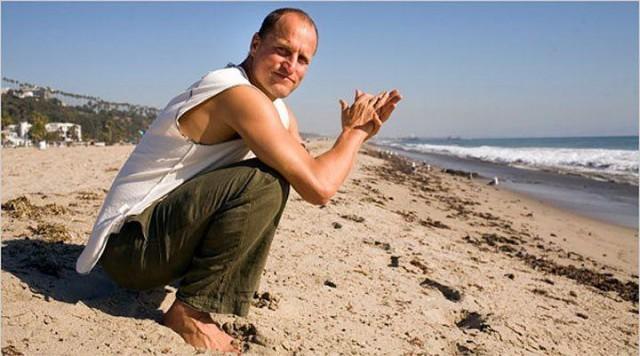
Talk about your performance of taking something serious and seeing the silliness, but also taking the silliness and showing that sometimes it's life and death.
It's an honor to be a part of this. Ruben is just a master at doing what you said. He can make you extremely uncomfortable. He can make you think. He can give you a sense of meaning and like there was a purpose to going to see the film. At the same time, and perhaps more importantly, he makes you laugh throughout, which is quite a trick.
How was it working with director Ruben?
Ruben is very much his own thing. It really is an exciting, visceral, profound experience to work with Ruben. He works in a very unique way. He talked about the way he gets energy from the actors, that everything from he's molding and all the takes. He is using the gong and he does everything to make the performance as great as it can be. It's really a revitalizing experience to come and work with someone like him. It was one of the greatest experiences of my life.
How much do you relate to your character?
My character's a Marxist. I'm not a Marxist, I'm an anarchist. But so, in that sense, we differ. I'm the kind of guy who just thinks it's abominable when a superpower with all this military might, with no provocation attacks, just unprovoked, attacks a country that is, like Ukraine. Terrible.
I love the character. He let my character be the voice of some of the message of the film. That was cool.
Charlbi Dean
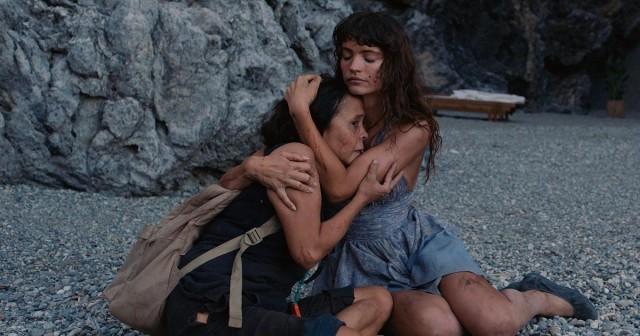
What do you think of the role that beauty plays in our social hierarchies, and what does it mean to you?
Coming from a fashion background, I definitely have an inside scoop into it, and it does play a role in it, whether you are aware of it or not. You see that in this film. What makes it so interesting is in real life, we do have a currency, whether it's our wealth or our beauty, or our influence or our power. Then, you're put into a situation where that currency is of no longer value. Then, who are you? What do you bring to the table? Will you be eaten first?
What were your thoughts when you finally knew what this movie was actually about?
Working with Ruben was already a win. You're so lucky to already get that opportunity. But I thought it was also important to bring a voice to models, as silly as that may sound to many. But girls and guys, I included travel from a really young age.
I left home at 13, I went to Tokyo. I was still afraid of the dark. I was in a city where I didn't speak the language. I didn't know how to get around. You're forced to grow up really quickly. People may look at you and be like, "Ah, you're pretty. You're vapid. You're not layered. You're not multidimensional." But in fact, there's a hard exterior that you don't really get to know without actually realizing what people in the fashion industry go through. We get to show that.
Harris Dickinson
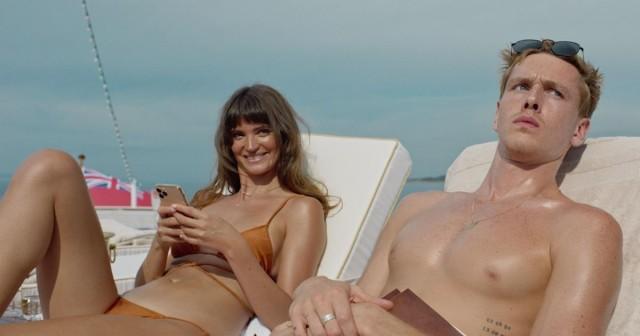
What do you think of the role that beauty plays in our social hierarchies, and what has it meant for you?
My character, Carl, very much knows where he stands. He uses it to his advantage, and it's something I value him for doing. Ruben makes very astute points about human behavior. He's incredibly observant and being a part of those conversations are informative and entertaining as well.
Ruben is very wonderful at picking holes in our behavior and our egos. With this character, I really had to try and let go of that and allow myself to be pathetic and offer myself up as a piece of meat. That's an absurd thing to do, but in the scenario, it's what works and it's what gets him forward.
At the beginning of the movie, there was this scene that deals with questions of equality, and of making women pay for a meal or not.
I know certain people who love the stereotypical gender roles, and I know that people are in relationships that enjoy having that, whether it's an imbalance or a balance. And I know people who are moving in a more equality based, modern way. I don't really have anything more to say about that.
But what I love about the way Ruben depicts those scenarios and the way we got to play that is that you get to scrutinize it, but you also get to leave it open to discussion and allow it to be something to explore rather than just this is what it should be.
What were your thoughts when you finally knew what this movie was actually about?
I would've played the donkey. I would have. It's just an honor to be a part of this. When we were auditioning, Ruben, he has such passion and excitement for it. He's also a really great actor as well. He read opposite for all the auditions. I remember being like, "Wow, if he can do all of these parts so well, how's it going to be directed?" It was just like immediate excitement from everything.
—MGP, GMA News



